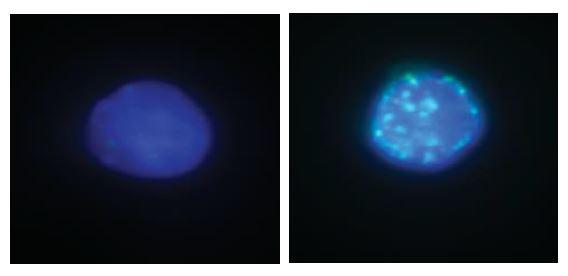
Submitted by Administrator on Mon, 21/08/2017 - 10:42
Cambridge scientists have uncovered genetic changes that result in a pre-cancerous stem cell population that can give rise to lymphoma, a cancer of the lymphatic system commonly diagnosed in people under 30.
The research published in the journal Nature Cell Biology shows how the genetic changes and resulting stem cell dysfunction creates a ‘perfect storm’ for lymphoma progression, demonstrating the need to understand and target stem cells in order to treat lymphoma at its source.
Stem cells are present in many organs of the body. They are capable of self-replication and function to maintain and repair damaged tissue. Stem cell dysfunction, however, can also underpin cancer development. Pre-malignant stem cells have been identified in a variety of different cancers, but until now, the existence and identity of this abnormal stem cell population in lymphoma, the fifth most common cancer in the UK, was unknown.
Researchers at the Wellcome - MRC Cambridge Stem Cell Institute used a mouse model to show that loss of CREBBP (CREB Binding Protein), a gene frequently mutated in human lymphomas, leads to the development of a pre-malignant stem cell population that evolves over time to ultimately give rise to full blown lymphoma.
The research also demonstrated that the timing of CREBBP loss is important in determining the development of lymphoma. Mice who lost their CREBBP gene early in haematopoiesis (the process of generating blood cells) developed white blood cell (lymphocyte) precursors with enhanced self-renewal properties and inadequate responses to DNA damage, resulting in the development of other mutations and a significant increase in lymphoma development.
Conversely, loss of CREBBP at a later time point, once the stem cells had committed to becoming lymphocytes, resulted in marked attenuation of lymphoma development. The team also demonstrated that mutations of CREBBP occur in the stem cells of patients who subsequently develop lymphoma, demonstrating the relevance of their findings to human disease.
“Loss of CREBBP results in a pre-malignant stem cell population that replicates excessively and does not respond appropriately to DNA damage. This seems to create a perfect storm for the subsequent acquisition of DNA mutations that lead to the development of lymphoma” explains Prof Brian Huntly. “To our knowledge, this research is the first to demonstrate the existence of a population of dysfunctional pre-malignant stem cells relating to mature lymphoid malignancy, an important finding in the search for effective therapeutics”.
The team will now develop this research further to understand exactly how loss of the CREBBP gene leads to alterations in the DNA damage pathway and are investigating whether these can be targeted therapeutically in lymphoma patients. They will also correlate whether the mutation developing in stem cells or in later lymphocytes affects patient outcome, determining if this knowledge will help guide patient prognosis and treatment. Answers to these questions will improve our understanding not only of lymphoma, but also other cancers that begin with stem cell dysfunction.
Brian Huntly is Professor of Leukaemia Stem Cell Biology and is part of the Wellcome – MRC Cambridge Stem Cell Institute. The support of the European Research Council, The Kay Kendall Leukaemia Fund, Medical Research Council, Bloodwise, Wellcome and the Cambridge NIHR Biomedical Research Centre has been invaluable in facilitating this research, and is gratefully acknowledged by Brian and the team.
Publication details:
Early loss of CREBBP confers malignant stem cell properties on lymphoid progenitors. S. J. Horton, G. Giotopoulos, H. Yun, S. Vohra, O. Sheppard, R. Bashford-Rogers, M. Rashid, A. Clipson, W. Chan, D. Sasca, L. Yiangou, H. Osaki, F. Basheer, P. Gallipoli, N. Burrows, A. Erdem, A. Sybirna, S. Foerster, W. Zhao, T. Sustic, A. Petrunkina Harrison, E. Laurenti, J. Okosun, D. Hodson, P. Wright, K. G. Smith, P. Maxwell, J. Fitzgibbon, M.Q. Du, D.J. Adams and B.J.P Huntly is published in Nature Cell Biology. DOI: 10.1038/ncb3597

